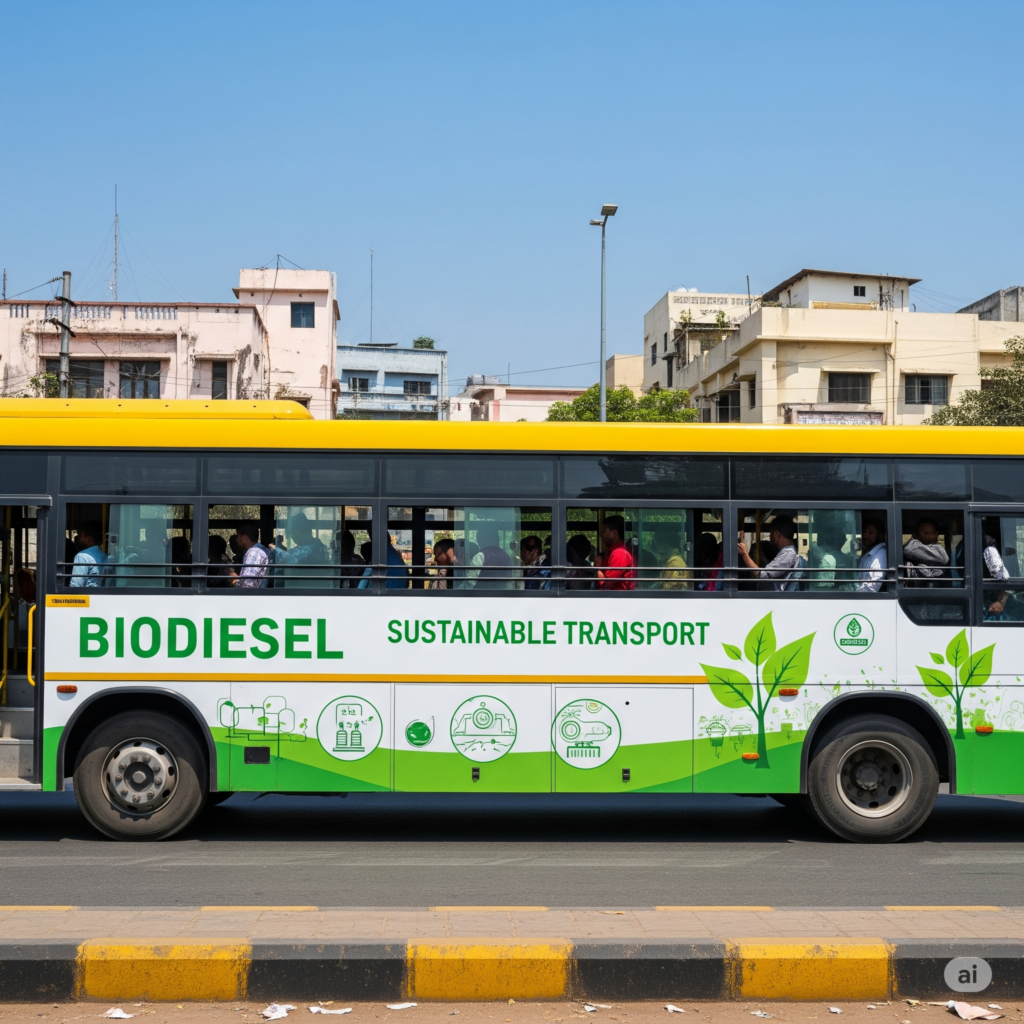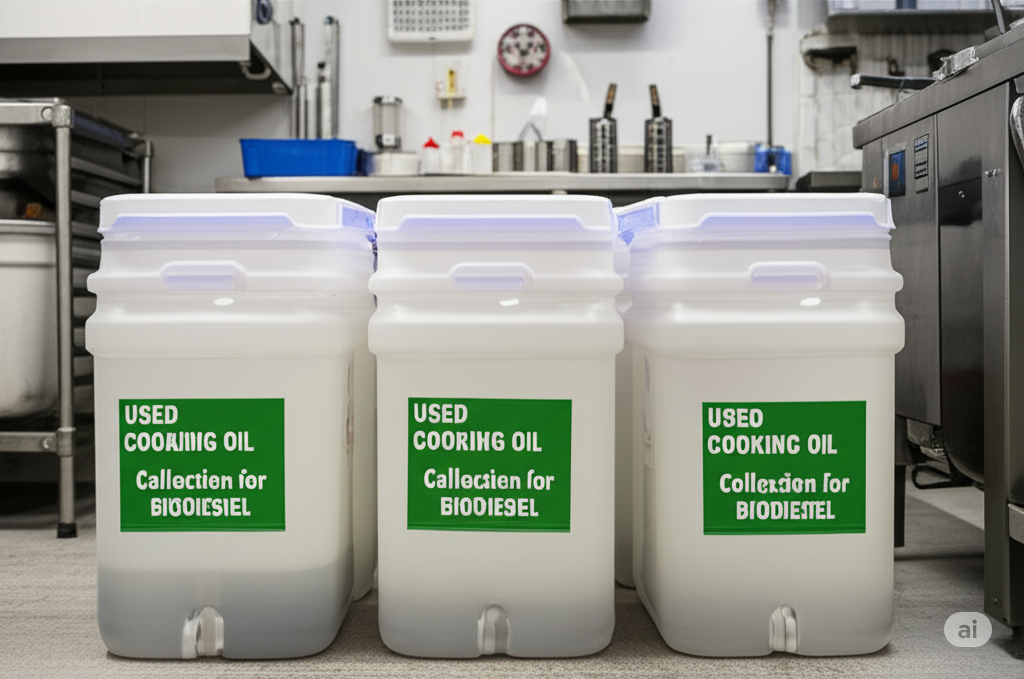Key Takeaways:
- Improper disposal or reuse of used cooking oil (UCO) poses major health risks.
- UCO is a valuable resource that can be converted into biodiesel.
- A holistic approach—technology, regulation, education, and enforcement—is essential.
- Safe collection and repurposing of UCO promotes sustainability and food safety.
- India is creating frameworks to manage UCO as part of its biofuel and clean energy missions.
The Hidden Danger in Your Kitchen
Most households and restaurants in India discard or reuse cooking oil without knowing its consequences. But what if we told you that this simple act poses serious public health risks and wastes a potential energy source?
Used Cooking Oil (UCO) when reused for frying or disposed of improperly contributes to chronic health issues like cancer and heart disease, while also harming the environment. At the same time, UCO is a hidden goldmine—it can be repurposed into biodiesel, a cleaner alternative to fossil fuels.
This blog explores the problem of UCO, the science behind converting it into biofuel, and how India can solve this issue through integrated policies, awareness, and technology.
What Is Used Cooking Oil (UCO)?
UCO refers to vegetable oil that has been used for frying or cooking and is no longer suitable for consumption. After multiple heating cycles, cooking oil degrades:
- Toxic compounds like polycyclic aromatic hydrocarbons (PAHs) and trans fats form.
- The oil becomes rancid, changes color, and affects food quality.
- Harmful to human health when reused repeatedly.
The Health Hazards of Reusing Cooking Oil
Despite its common practice, reusing cooking oil is dangerous:
- Carcinogenic substances: Long-term use linked to cancers
- Increased cholesterol: Trans fats promote cardiovascular diseases
- Free radicals: Lead to oxidative stress, aging, and chronic diseases
A 2020 study by FSSAI found that oils reused beyond the third fry contain up to 3x higher levels of toxic aldehydes, far exceeding safety limits.
The Environmental Impact of Disposing UCO Improperly
Used cooking oil, when poured down the drain or thrown in open garbage, creates multiple issues:
- Clogs sewage systems
- Contaminates water sources
- Harms soil microbes and marine ecosystems
Additionally, improper disposal prevents the oil from being used as a valuable feedstock for renewable biofuel production.
The Biofuel Opportunity: Turning Waste into Wealth

One liter of UCO can be converted into approximately 0.85 liters of biodiesel.
Benefits of UCO-derived biodiesel:
- Reduces greenhouse gas emissions by up to 80%
- Performs similar to petroleum diesel
- Non-toxic and biodegradable
- Can power transport vehicles, generators, and industrial equipment
Countries like Germany, the USA, and Brazil have scaled UCO collection and biodiesel production successfully.
India’s Push for UCO Repurposing
India generates 1.2 million metric tonnes of UCO annually, but only a small fraction is collected.
To address this, the Food Safety and Standards Authority of India (FSSAI) launched the RUCO (Repurpose Used Cooking Oil) initiative.
Key RUCO Objectives:
- Identify bulk UCO producers (restaurants, food chains, caterers)
- License collection agencies and biodiesel producers
- Educate the public on safe disposal
- Prevent UCO from re-entering the food supply chain
Technology and Innovation in UCO Collection
Private startups and government initiatives are leveraging technology to streamline UCO collection:
- IoT-based bins: Monitor UCO levels in commercial kitchens
- Mobile apps: Track collection schedules and pickups
- Blockchain tech: Ensure traceability and transparency in the UCO supply chain
These innovations make it easier for stakeholders to safely handle and monetize UCO.
Policy and Enforcement: The Role of Regulation
To make UCO repurposing mainstream, regulation must work alongside innovation:
- Mandatory UCO disposal guidelines for large food businesses
- Strict penalties for unsafe reuse or illegal sale of UCO
- Incentives for businesses participating in biodiesel conversion
FSSAI, the Ministry of Petroleum, and State Pollution Control Boards must collaborate to create enforceable UCO frameworks.
Raising Public Awareness and Educating Households
A large share of UCO comes from homes. Public awareness campaigns should:
- Teach households how to identify degraded oil
- Provide drop-off points for UCO
- Promote health risks of reuse
School programs, TV campaigns, and digital influencers can be powerful tools in educating the masses.
Challenges and the Way Forward
Despite its potential, India faces roadblocks:
- Fragmented UCO supply chains
- Lack of awareness in rural and semi-urban areas
- Low profit margins in biodiesel market
Recommendations:
- Government-backed buyback programs for UCO
- Public-private partnerships
- Cross-industry collaborations (food + fuel)
Conclusion: Waste Not, Fuel More
Used cooking oil may seem like kitchen waste, but it is an untapped resource. With the right mix of policy, technology, enforcement, and public education, UCO can transform into a key player in India’s clean energy future.
Repurposing UCO not only improves food safety and public health but also contributes to climate goals, making it a win-win for all.









+ There are no comments
Add yours